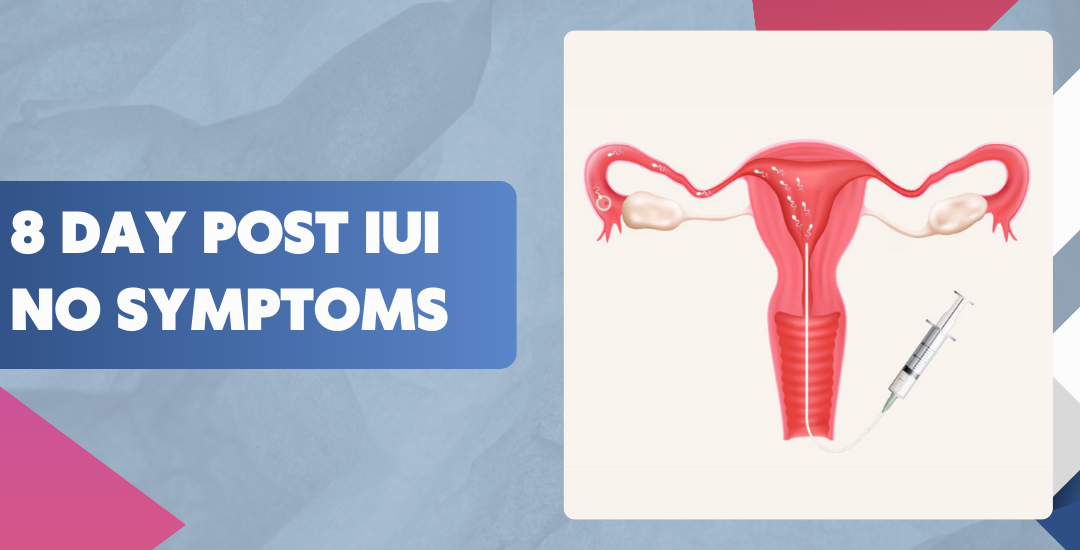One of the most common fertility treatments is intrauterine insemination (IUI). In IUI, sperm is directly injected into the uterus to start conception. It is often used to overcome fertility problems. These include low sperm count, cervical disruption, or unexplained infertility.
Dr. Shweta Shah, a leading gynecologist in Andheri, is an expert in fertility treatments. She provides expert medical care, personalized attention, and emotional support. Individuals who show no symptoms 8 days after IUI can benefit from her services.
Her approach is designed to address not just the physical aspects of fertility treatment but also the psychological well-being of her patients.
Seeking expert insights to address your concerns? Schedule an appointment today.
At this stage, you might be a lot anxious and need clarity on your situation. Let’s take a look at when to expect pregnancy symptoms.
When Does One Start To Experience IUI Symptoms?
According to the gynecologist in Andheri West, pregnancy signs can show up differently for everyone. Some may feel them soon after IUI, while others may take longer. Women who just underwent IUI treatment can expect to experience pregnancy symptoms within 6 to 12 days, in some cases even 14 days.
Is It Normal To Not Have Any Symptoms 8 Days Post IUI?
Remember, pregnancy symptoms can vary from person to person and may depend on various factors, including hormonal changes, implantation timing, and individual physiology.
8th day after IUI no symptoms, is nothing to worry about. It is a normal occurrence. Be calm and avoid stress.
However, be vigilant of your body. If you notice anything unusual, seek medical advice from your doctor right away.
Have questions about IUI pregnancy symptoms? Reach out to the clinic for answers.
Wondering why you are not experiencing symptoms early on? Let’s look at some factors.
Causes Of Having No Symptoms 8 Days Post IUI
- Early Stage of Pregnancy:
It’s still too early for symptoms to show up. Pregnancy signs often appear within a couple of weeks.
- Variability in Individual Response:
Everyone’s bodies react differently to pregnancy. While some individuals may notice early signs such as breast tenderness or fatigue soon after conception, others may not experience any symptoms at this stage.
- Timing of Implantation:
Conception and implantation of the fertilized egg can vary from person to person. Sometimes, the fertilized egg takes longer to implant, delaying symptom onset.
- Hormonal Fluctuations:
Hormones rise and fall many times during pregnancy. If there are no symptoms 8th day after IUI it’s most likely due to hormones not reaching the desired threshold.
- Psychological Factors:
Anxiety, stress, and heightened awareness of potential symptoms can also influence how individuals perceive and interpret physical sensations. Sometimes, the absence of symptoms may be more related to psychological factors rather than actual physiological changes.
Still waiting for signs of pregnancy? Connect with an expert for a better understanding of the matter.
Check out some important pointers on what you can do if it’s your 8th day after IUI and no symptoms.
What Should Be Done If You Experience No Symptoms 8 Days Post IUI?

Experiencing day 8 post IUI and no symptoms can be a source of anxiety for many. However, it’s crucial to understand that this is a common scenario and not necessarily indicative of a negative outcome.
- Monitor for Symptoms
While you might not experience symptoms immediately, keep an eye out for any subtle changes in the coming days and weeks.
- Healthy Lifestyle
Continue to follow a healthy lifestyle. Proper nutrition, adequate rest, and avoiding harmful substances contribute to a favorable environment for early pregnancy.
- Manage Stress
Stress and anxiety can impact your perception of symptoms. Engage in stress-reducing activities and focus on maintaining a positive mindset.
- Patience is Key
Patience during this waiting period is essential. The two-week wait post-IUI is a challenging time, but understanding that symptoms can vary widely may help ease the anxiety.
- Avoid Comparison
Don’t compare your journey to others. Every pregnancy experience is distinct, and there’s a broad spectrum of what’s considered normal for early pregnancy symptoms.
- Consult Your Doctor
If the absence of symptoms is overwhelming you, schedule a follow-up appointment with your gynecologist. The doctor can provide reassurance and, if necessary, perform tests to check on your progress.
Seeking personalized fertility care? Schedule a visit to the clinic today.
Conclusion
Experiencing no symptoms 8 days after an IUI procedure is common. Do not jump to conclusions about the treatment’s success. Patience is key. Understanding the IUI procedure and knowing what to expect is crucial for making informed decisions.
Fertility experts like Dr. Shweta Shah also play a crucial role in guiding patients through this uncertain period, providing emotional support along with personalized treatments.
Summing up, you are not alone in this situation. Keep your spirits up and be hopeful of a better outcome. Your plans for future pregnancy do not end here.
Take a look below for FAQs if you still have some doubts.
Frequently Asked Questions
Could No Symptoms Indicate a Failed IUI?
Not necessarily. The absence of symptoms does not directly correlate with the success or failure of the IUI procedure. It’s important to wait for a pregnancy test for confirmation.
When Should I Take a Pregnancy Test?
It’s advisable to wait until at least 14 days post-IUI to take a pregnancy test for a more accurate result. Testing too early can lead to false negatives.
Can Diet Influence My Post-IUI Experience?
While diet doesn’t directly impact the success of IUI, eating a balanced diet can support your overall health and well-being during the waiting period.
What Support Resources Are Available?
Many find comfort in speaking with others who have gone through similar experiences. Consider joining a support group or forum dedicated to fertility discussions.

